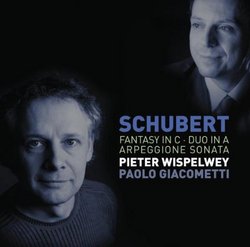New territory for Schubert and the cello, done in period sty
Santa Fe Listener | Santa Fe, NM USA | 04/20/2010
(4 out of 5 stars)
"None of the music on this CD was written for the cello, even though the most familiar work, the "Arpeggione" Sonata D. 821 has entered the cello repertoire and become a staple. The work was originally written for the "guitar violoncello," as the arpeggione is described -- a six-stringed instrument tuned in thirds. The arpeggione went the way of the dodo very quickly, but Schubert's piece was too god to allow it to sink out of sight. Cellists find it a daunting work, and all tings being equal, the viola is better suited to Schubert's sonata, given how high much of the it lies. The Dutch virtuoso Pieter Wispelwey has not the slightest difficulty, however, and to offer himself a harder challenge, he plays with gut strings instead of steel, in order, he says, to give us what Schubert might have heard. In the same vein, his excellent accompanist, Paolo Giacometti, plays on a fortepiano form 1815.
I'm not a fan of period performance, which is why I've given this reading only four stars. Wispelwey avoids all the traps in the "Arpeggione," which can be too repetitive and melancholy in the wrong hands. His account is lively, with a nice rhythmic snap, but with steel strings (I've heard him live) he's much bolder and more forceful. Taming the sonata with the mellower gut strings affords a nice timbre, but I'd rather hear the other Wispelwey, the risk-taking virtuoso. The same holds true for the rest of the CD, which consists of transcriptions of music originally written for violin. The Duo for Cello and Piano D. 574 and especially the very late Fantasy in C D. 934, sit surprisingly well on the deeper-voiced instrument. Wisplewey could hardly be bettered. He is a sterling musician, and so is Giacometti, who comes across as an independent voice and not simply an accompanist. But after half an hour of hearing the cello played with scant vibrato and the fortepiano piddling along, I had had enough, bemoaning my bad luck that the cover of this CD didn't warn me that it was a period product."

